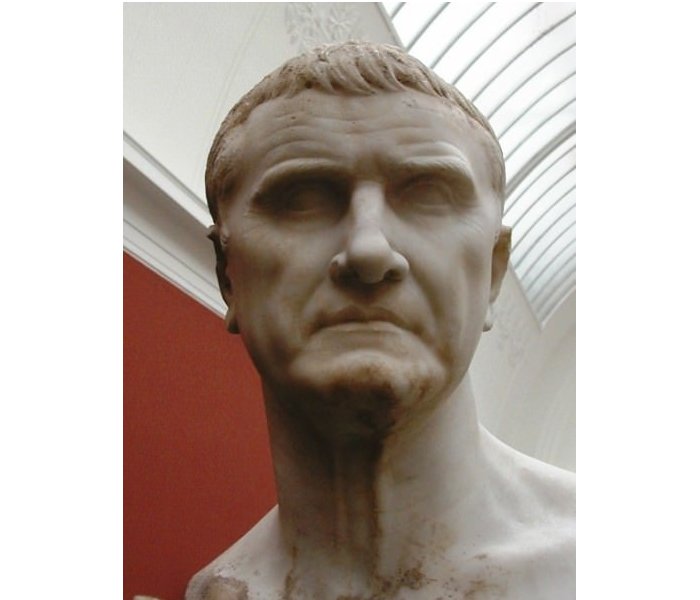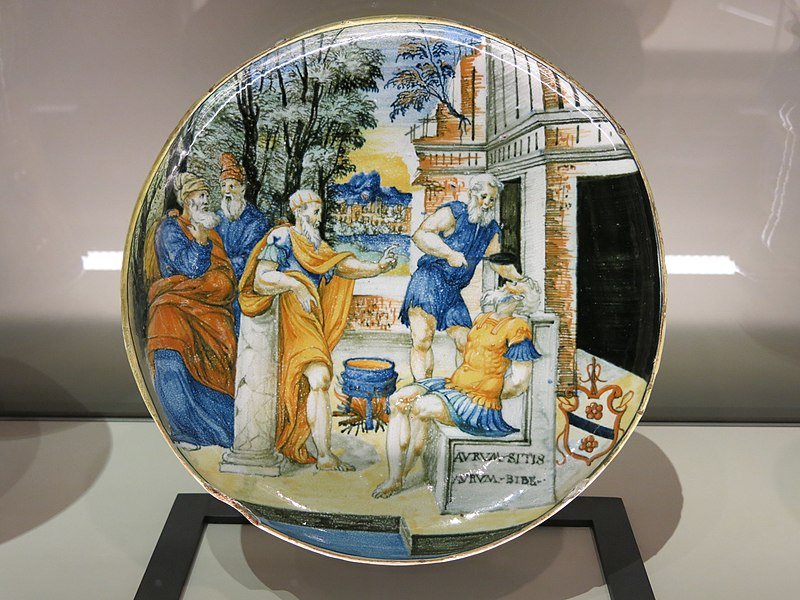Did Crassus, Ancient Rome’s Wealthiest Man Really Die From Drinking Molten Gold?
Ellen Lloyd - AncientPages.com - Marcus Licinius Crassus (c. 115 B.C. —53 BC.) was a Roman general and politician. Today, he is remembered as the wealthiest man in ancient Rome, suppressing the slave revolt led by Spartacus and forming the so-called First Triumvirate with Julius Caesar and Pompey to challenge the Senate's power effectively.
A bust of Roman statesman and general Marcus Licinius Crassus (c. 115-53 BCE). Glyptothek, Copenhagen. Image credit: Diagram Lajard - Public Domain
When Crassus died, a Civil War broke out between Caesar and Pompey. According to some historical sources, Crassus died from drinking molten gold, but is this really true?
Crassus was born a wealthy man but lost his entire inheritance during the Marian-Cinnan proscriptions. He was forced to flee to Hispania (the Roman name for the Iberian Peninsula).
Crassus got his revenge while commanding the left wing of Lucius Cornelius Sulla's army, making a fortune from proscriptions himself.
Soon Crassus became a wealthy man. He earned his fortune from prescriptions, slave trafficking, judicious purchases of land and houses, and purchases of burning property.
Ancient Roman army and their general. Credit: Adobe Stock - vukkostic
Prescriptions were only part of his overall wealth. It is said that after receiving word of houses being on fire, Crassus would arrive with an army of 500 "firefighters" and attempt to offer a modest sum for the property. Crassus would let the property burn to the ground if the offer was refused.
Crassus became a politician and used his wealth to gain support from senators. However, wealth was not enough to give Crassus the power he wanted. Crassus needed a military victory to consolidate his grip on power and make a name for himself in military matters. Crassus used Syria as the launchpad for a military campaign against the Parthian Empire, Rome's long-time Eastern enemy.
The Parthian people had established an empire that lasted almost 500 years, from the mid-3rd century BC until 224 CE. Crassus' military campaign was a disastrous failure, resulting in his defeat and death at the Battle of Carrhae.
It remains unknown whether Crassus died fighting or committed suicide to prevent being captured.
Historian Cassius Dio wrote that the enemy “poured molten gold into his mouth. The torture of Crassus. Faience. Circa 1530-1540 - Louvre Museum. Credit: Tangopaso - Public Domain
Crassus was well-known for being greedy. Plutarch said that "before he (Crassus) went upon his Parthian expedition, he found his possessions to amount to seven thousand one hundred talents; most of which, if we may scandal him with a truth, he got by fire and rapine, making his advantages of the public calamities." He died in pursuit of wealth from Asia."
The rumor about "dying from drinking molten gold" can be traced to historian Cassius Dio who wrote that having discovered his body, the enemy "poured molten gold into his mouth in mockery for he had set great store by money."
Where and how exactly Dio obtained this information is unknown, but it helped Roman prejudices about Parthian brutality.
Written by - Ellen Lloyd – AncientPages.com
Updated on February 11, 2023
Copyright © AncientPages.com All rights reserved. This material may not be published, broadcast, rewritten or redistributed in whole or part without the express written permission of AncientPages.com
Expand for referencesMore From Ancient Pages
-
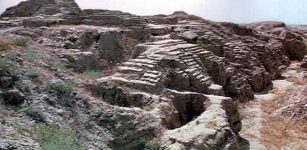 Ashur – First Capital And Powerful Religious Center Of The Assyrian Empire
Featured Stories | Jun 28, 2019
Ashur – First Capital And Powerful Religious Center Of The Assyrian Empire
Featured Stories | Jun 28, 2019 -
 Ancient History Of Body Modification In Mesoamerica Practiced By The Aztecs, Maya And Olmecs
Ancient Traditions And Customs | Jul 12, 2017
Ancient History Of Body Modification In Mesoamerica Practiced By The Aztecs, Maya And Olmecs
Ancient Traditions And Customs | Jul 12, 2017 -
 Strange Tales Of Loughareema – The Vanishing Lake Where People Are Lost
Featured Stories | Jan 8, 2022
Strange Tales Of Loughareema – The Vanishing Lake Where People Are Lost
Featured Stories | Jan 8, 2022 -
 Enigmatic Ancient Kingdom Of Thulamela Created By Mysterious Shona People
Civilizations | Dec 28, 2016
Enigmatic Ancient Kingdom Of Thulamela Created By Mysterious Shona People
Civilizations | Dec 28, 2016 -
 Maat – Ancient Egypt’s Most Important Religious Concept
Egyptian Mythology | Apr 4, 2018
Maat – Ancient Egypt’s Most Important Religious Concept
Egyptian Mythology | Apr 4, 2018 -
 Horus – One Of The Most Important Ancient Egyptian Gods And Symbol Of Rulership and Justice
Egyptian Mythology | Jun 26, 2018
Horus – One Of The Most Important Ancient Egyptian Gods And Symbol Of Rulership and Justice
Egyptian Mythology | Jun 26, 2018 -
 Surtshellir Cave Reveals How Vikings Attempted To Prevent Ragnarök – Doom Of The Gods
Vikings | Jul 17, 2023
Surtshellir Cave Reveals How Vikings Attempted To Prevent Ragnarök – Doom Of The Gods
Vikings | Jul 17, 2023 -
 On This Day In History: Francis Baily First Observed ‘Baily’s Beads’ – On May 15, 1836
News | May 15, 2016
On This Day In History: Francis Baily First Observed ‘Baily’s Beads’ – On May 15, 1836
News | May 15, 2016 -
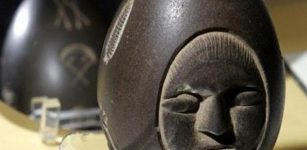 America’s Ancient “Mystery Stone” Remains An Unexplained Puzzle
Artifacts | Apr 17, 2014
America’s Ancient “Mystery Stone” Remains An Unexplained Puzzle
Artifacts | Apr 17, 2014 -
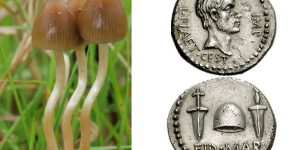 Strange Tale How The Liberty Cap Mushroom Got Its Name Starts In Ancient Rome
Featured Stories | Sep 3, 2023
Strange Tale How The Liberty Cap Mushroom Got Its Name Starts In Ancient Rome
Featured Stories | Sep 3, 2023 -
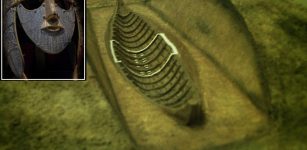 Sutton Hoo Ship Burial And Famous Helmet That Could Belong To Raedwald, King Of All The Kings Of Britain
Artifacts | Jan 9, 2018
Sutton Hoo Ship Burial And Famous Helmet That Could Belong To Raedwald, King Of All The Kings Of Britain
Artifacts | Jan 9, 2018 -
 Unexplained Disappearance Of East Balkan Civilizations – Discovery Of Unusual Mini Artifacts – Part 1
Ancient Mysteries | Apr 28, 2018
Unexplained Disappearance Of East Balkan Civilizations – Discovery Of Unusual Mini Artifacts – Part 1
Ancient Mysteries | Apr 28, 2018 -
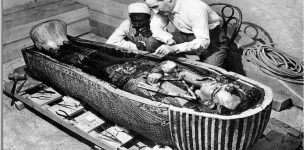 On This Day In History: King Tut’s Tomb Is Unsealed And Opened – On Feb 16,1923
News | Feb 16, 2017
On This Day In History: King Tut’s Tomb Is Unsealed And Opened – On Feb 16,1923
News | Feb 16, 2017 -
 Massive Head Of Hercules Pulled From The Antikythera Shipwreck
Archaeology | Jun 23, 2022
Massive Head Of Hercules Pulled From The Antikythera Shipwreck
Archaeology | Jun 23, 2022 -
 On This Day In History: Charter Of The Forest Was First Issued On London – On Nov 6, 1217
Featured Stories | Nov 6, 2016
On This Day In History: Charter Of The Forest Was First Issued On London – On Nov 6, 1217
Featured Stories | Nov 6, 2016 -
 Ancient Secrets Of Karelia: Mysterious Vottovaara Mountain Was Sacred To The Sami People
Featured Stories | Apr 5, 2017
Ancient Secrets Of Karelia: Mysterious Vottovaara Mountain Was Sacred To The Sami People
Featured Stories | Apr 5, 2017 -
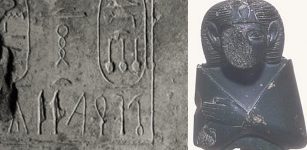 Sobekneferu: First Female Pharaoh In Ancient Egypt
Featured Stories | Mar 9, 2019
Sobekneferu: First Female Pharaoh In Ancient Egypt
Featured Stories | Mar 9, 2019 -
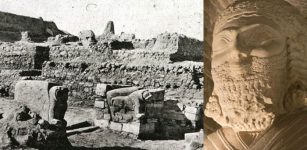 Arslantepe Mound – Home To The Oldest City-State Of Anatolia
Featured Stories | Jun 7, 2022
Arslantepe Mound – Home To The Oldest City-State Of Anatolia
Featured Stories | Jun 7, 2022 -
 Ruins Of Post-Medieval Brunell Township Discovered In Glen Brittle Forest On The Isle of Skye
Archaeology | Feb 29, 2024
Ruins Of Post-Medieval Brunell Township Discovered In Glen Brittle Forest On The Isle of Skye
Archaeology | Feb 29, 2024 -
 Ponte di Cecco – Legend Of A Bridge Built By An Astrologer With The Help Of The Devil
Featured Stories | Aug 19, 2021
Ponte di Cecco – Legend Of A Bridge Built By An Astrologer With The Help Of The Devil
Featured Stories | Aug 19, 2021

